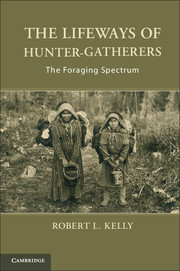Book contents
- Frontmatter
- Contents
- Tables
- Figures
- Preface
- Acknowledgments
- One Hunter-Gatherers and Anthropology
- Two Environment, Evolution, and Anthropological Theory
- Three Foraging and Subsistence
- Four Mobility
- Five Technology
- Six Sharing, Exchange, and Land Tenure
- Seven Group Size and Demography
- Eight Men, Women, and Foraging
- Nine Nonegalitarian Hunter-Gatherers
- Ten Hunter-Gatherers and Prehistory
- Notes
- References
- Index
Nine - Nonegalitarian Hunter-Gatherers
Published online by Cambridge University Press: 05 April 2013
- Frontmatter
- Contents
- Tables
- Figures
- Preface
- Acknowledgments
- One Hunter-Gatherers and Anthropology
- Two Environment, Evolution, and Anthropological Theory
- Three Foraging and Subsistence
- Four Mobility
- Five Technology
- Six Sharing, Exchange, and Land Tenure
- Seven Group Size and Demography
- Eight Men, Women, and Foraging
- Nine Nonegalitarian Hunter-Gatherers
- Ten Hunter-Gatherers and Prehistory
- Notes
- References
- Index
Summary
When a young man kills much meat, he comes to think of himself as a chief or a big man, and he thinks of the rest of us as his servants or inferiors. We can't accept this. We refuse one who boasts, for someday his pride will make him kill somebody. So we always speak of his meat as worthless. In this way we cool his heart and make him gentle.
Ju/’hoan man (Lee 1979: 246)You know that every time when the tribes come to our village, we always have four or five more to give blankets away than they have. Therefore, take care, young chiefs! else you will lose your high and lofty name; for our grandfathers were never beaten in war of blood nor in war of wealth, and therefore all the tribes are below us Kwakiutl in rank.
Kwakwak'awakw man (Codere 1950: 120)If I asked the average anthropology student to imagine a group of hunter-gatherers, it is most likely that the Ju/’hoansi would come to mind: small, peaceful, nomadic bands composed of men and women with few possessions and who are equal in wealth, opportunity, and status. Yet, given the prominence of the potlatch in introductory courses, the average student is also aware of cases that easily overturn that image: large, sedentary, warring, possession-laden Northwest Coast societies, where men boasted of their exploits, status, and power.
Anthropologists have used the terms simple and complex or nonaffluent and affluent to distinguish these two types of foraging societies (Table 9-1; Price and Brown 1985b; Grier, Kim, and Uchiyama 2006).
- Type
- Chapter
- Information
- The Lifeways of Hunter-GatherersThe Foraging Spectrum, pp. 241 - 268Publisher: Cambridge University PressPrint publication year: 2013



